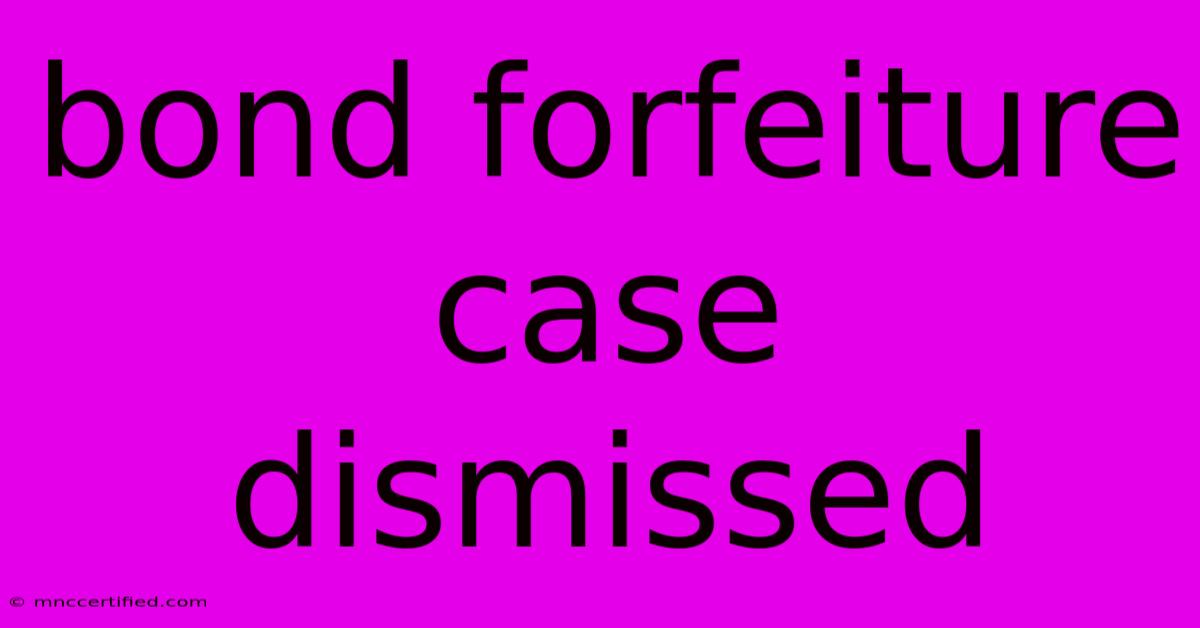Bond Forfeiture Case Dismissed

Table of Contents
Bond Forfeiture Case Dismissed: Understanding the Implications
A bond forfeiture case being dismissed is a significant event, offering relief to the defendant and potentially impacting future legal proceedings. This article explores the reasons why such dismissals occur, their implications, and the steps involved. Understanding this process is crucial for anyone involved in a bond forfeiture case, whether as a defendant, surety, or legal professional.
What is a Bond Forfeiture?
Before delving into dismissals, let's clarify what a bond forfeiture is. A bond forfeiture occurs when a defendant fails to appear in court as required after being released on bail. The bail bond, a financial guarantee ensuring court attendance, is then forfeited, meaning the surety (often a bondsman) or the defendant themselves loses the money posted. This process can have serious financial and legal consequences.
Reasons for Dismissal of a Bond Forfeiture Case
Several reasons can lead to a bond forfeiture case being dismissed. These often involve demonstrating extenuating circumstances or procedural errors:
1. Defendant's Appearance: The Simplest Solution
The most straightforward reason is the defendant's subsequent appearance in court. If the defendant, after initially failing to appear, manages to present themselves before the court and explain their absence, the judge might choose to dismiss the forfeiture. This often requires a compelling explanation for the missed court date.
2. Procedural Errors by the Prosecution
Mistakes made by the prosecution during the forfeiture proceedings can lead to dismissal. This could include failure to properly serve notices, incorrect paperwork, or violations of due process. A skilled attorney can identify and leverage such errors to get the case dismissed.
3. Extenuating Circumstances
Valid reasons for missing a court date might include serious illness, natural disasters, or other unforeseen emergencies. Strong evidence supporting these claims can convince a judge to dismiss the forfeiture. Documentation is key in these cases.
4. Lack of Due Diligence by the Prosecution
If the prosecution fails to actively pursue the forfeiture, the judge may decide to dismiss the case. This is less common but possible if there's a lack of evidence or a demonstrable lack of effort from the prosecuting party.
5. Agreement Between Parties
In some situations, an agreement between the defendant (or surety) and the prosecution might result in a dismissal. This could involve negotiation and potentially a reduced penalty.
Implications of a Dismissed Bond Forfeiture Case
A dismissal signifies the end of the forfeiture proceedings. The surety (if applicable) retains the money posted, and the defendant avoids the penalties associated with forfeiture, including fines, additional charges, and potential warrant issuance. However, this doesn't erase the original charges against the defendant; these will still need to be addressed through the main court case.
Steps to Take if Your Bond Forfeiture Case is Dismissed
While the dismissal resolves the immediate forfeiture issue, it's important to:
- Obtain official documentation: This confirms the dismissal and can be valuable in future legal matters.
- Review the original charges: Focus your attention on the primary legal case and prepare your defense.
- Consult with your attorney: Discuss the implications of the dismissal and any further legal steps.
Seeking Legal Counsel: A Crucial Step
Navigating a bond forfeiture case, especially when seeking dismissal, requires legal expertise. An experienced attorney can analyze your situation, identify potential grounds for dismissal, and effectively represent your interests before the court. Don't hesitate to seek professional legal advice if facing a bond forfeiture. The outcome can significantly impact your financial and legal future.
Keywords: Bond forfeiture, case dismissed, bail bond, surety, defendant, court appearance, dismissal reasons, procedural errors, extenuating circumstances, legal implications, legal counsel, attorney, due process.

Thank you for visiting our website wich cover about Bond Forfeiture Case Dismissed. We hope the information provided has been useful to you. Feel free to contact us if you have any questions or need further assistance. See you next time and dont miss to bookmark.
Featured Posts
-
Menendez Brothers Hearing Delayed To January
Nov 26, 2024
-
Rod Stewarts Glastonbury 2025 Legends Show
Nov 26, 2024
-
Black Friday Steam Deck Discounts Extended
Nov 26, 2024
-
Trust Deed Investing California
Nov 26, 2024
-
West Ham Defeats Newcastle 2 0
Nov 26, 2024